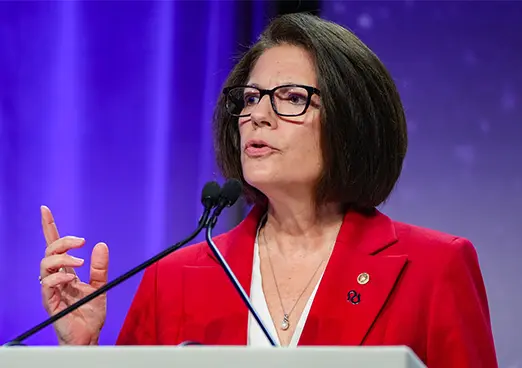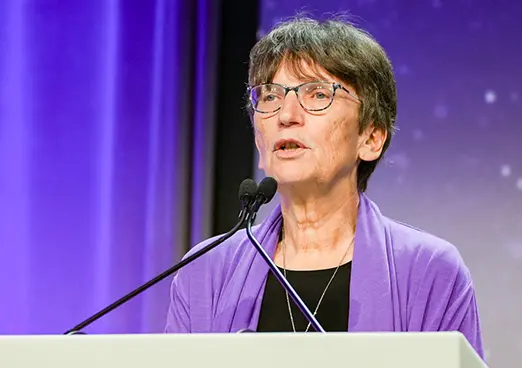Leaders and advocates honored at National Alzheimer's Dinner
After preparing for visits with legislators to urge them to keep Alzheimer's a national priority, more than 1,100 advocates from all 50 states gathered at the National Alzheimer's Dinner during the Alzheimer's Impact Movement (AIM) Advocacy Forum. Attendees celebrated accomplishments and recognized leaders for their critical efforts in the fight against the disease.
Actor and Alzheimer's Association Celebrity Champion Diedrich Bader served as emcee. Bader's father — an accomplished statesman who, among other roles, served as a naval intelligence officer and worked for the CIA — was diagnosed with Alzheimer's in 2013 and died three years later at the age of 84.
Bader related how difficult it was to see his father live with the disease but also said there were moments of humor, love and connection.
"One time, I asked my dad to put on his pajamas and he came out in his full Navy whites," Bader said. "It was hard to get angry in that moment as I looked at him — he was just so proud standing there in his Navy whites. The surprise of him coming out dressed that way was genuinely funny to me. I think it's important to find those moments and hold on to them."
Bader thanked advocates for bringing him a sense of hope for the future and for their dedication to ending Alzheimer's.
"When you stop and think about this disease and what it's robbed us of, it would be easy to feel down, natural to want to run away from reminders. But instead you show up," Bader said. "We're the first generation where there is actually hope. I mean that sincerely. One of the things about watching my father's decline was the fear that it could happen to me. But because of you, because of your tenacity and your advocacy, I have hope. Thank you for your passion — and for giving me hope."
Have the tough conversations
Joanne Pike, DrPh, Alzheimer's Association president and CEO and AIM CEO, presented the evening's first AIM Humanitarian Award, given annually to public officials who have made significant contributions to advance research and enhance care and support for those living with dementia and their caregivers. Sen. Catherine Cortez Masto (D-Nev.) was honored for continued action to address the Alzheimer's crisis and her determination to help affected families.

Sen. Catherine Cortez Masto (D-Nev.) speaks after receiving the AIM Humanitarian Award.
"Since joining the Senate, she has made Alzheimer's a priority, drawing from her own family's experience and her time as a caregiver to passionately advocate for all those affected by the disease," Pike said, noting Cortez Masto's role in the BOLD Infrastructure for Alzheimer's Act, which ensures crucial investment in the Alzheimer's public health infrastructure. "Her leadership has been invaluable as we look back on the bipartisan legislative successes of the past few years."
Cortez Masto lost her grandmother to Alzheimer's. She said that's why she continues to fight to end the disease, and she offered advice to advocates as they prepared to visit legislators on Capitol Hill.
"My advice is don’t shy away from the tough conversations, from telling the truth about what’s happening in your communities," she said. "We can make a difference at the end of the day if we stand together. I hope we have a sea of purple on Capitol Hill tomorrow, I will be looking for you."
Shine a light
AIM Board Chair Bob Thomas took the stage to commemorate AIM's 15th anniversary and the great progress the organization (a separately incorporated advocacy affiliate of the Association) has made. Thomas served on the Association's board at the time of AIM's creation; he noted that it became clear to Association leadership that something needed to be done to bring clarity to how Congress should be concerned about Alzheimer's, while also shining a light on the Association as the world's trusted expert on the disease.
"The Alzheimer's Association needed AIM because it needed a different inroad to build relationships in Congress," Thomas said. "The Association was clear-eyed in realizing it could not move this cause forward as quickly as needed without activating a national strategy. And in a bold move 15 years ago, it made it happen.
"I am convinced it is our firm conviction, balanced in kindness, compassion and warmth, which will nourish our tenacity and resolve for a world without Alzheimer's and all other dementia."
Advocate continues the fight
Bader presented the AIM Advocate of the Year Award to Bertha Bullen of Michigan, who has been volunteering with the Association and AIM for over 15 years. Among her accomplishments, Bullen has developed strong relationships with state and federal lawmakers; helped to recruit, train and mentor new advocates; and attends the Michigan State Advocacy Day every year, showing up early to help prepare materials and set up for the event. She has also been involved with Walk to End Alzheimer's®.
Alzheimer's has had a profound effect on Bullen and her family, which has spurred her advocacy efforts. Over 40 years ago, Bullen's mother-in-law was diagnosed with Alzheimer's, and she later lost her grandmother to the disease. Then her mother developed Alzheimer's and died shortly after Bullen's grandmother's death.

Advocate of the Year Bertha Bullen.
"When my mother no longer recognized her family, robbing her of the one thing she loved most, I knew I had to do something," Bullen said. "I just didn’t know what that something was until I found the Alzheimer’s Association. That's when I began to fight and to heal."
Three years ago, Bullen's brother died with dementia; last summer, her sister was diagnosed with mild cognitive impairment due to Alzheimer's. So her fight continues.
"Tomorrow, we will grab a purple sash and take our passion to the Hill," she says. "We will tell our stories. Singly, our stories are mere whispers in the wind. But together, those whispers become the roar of a powerful hurricane."
Rob Egge, chief public policy officer of the Alzheimer's Association and AIM president, announced the second recipient of the AIM Humanitarian Award, Sen. Bill Cassidy (R-La.).
Egge said that Cassidy has been an outstanding champion for people living with dementia, supporting critical increases in federal Alzheimer's and dementia research. As chair of the Senate HELP Committee, Cassidy "has been a leader in ensuring individuals impacted by Alzheimer’s and other dementia receive the quality care and assistance they so rightfully deserve."
Cassidy was unable to attend the dinner but said via video: "I'm honored to receive this award. I appreciate your advocacy on behalf of people living with Alzheimer's and their families who support them … with our shared efforts, we can work to live in a world in which Alzheimer's no longer exists."
Egge closed the evening by remarking on the strength of the Alzheimer's community and what can be accomplished when working together. Over the past 15 years, the Association and AIM have been instrumental in accomplishments such as unprecedented research funding increases; a national plan that guides our nation’s approach to combatting dementia; new treatments; and better access to care and support services, including Medicare’s first nationwide dementia care model — and much more.
"These are not just talking points. These are not just things we put in a video. These are public policy advances that are making a real impact for Americans every day," Egge said. "I’m so proud of how far we’ve come, together, thanks to each of you — how we’ve pushed and pushed and brought the cause to this moment that we’re at right now. As we’ve discussed over the past few days, the road ahead will not be smooth, but I know working together — and because of each of you — we will go even further. We’ll have more victories, and we’ll achieve more for the simple reason that we have to achieve more."